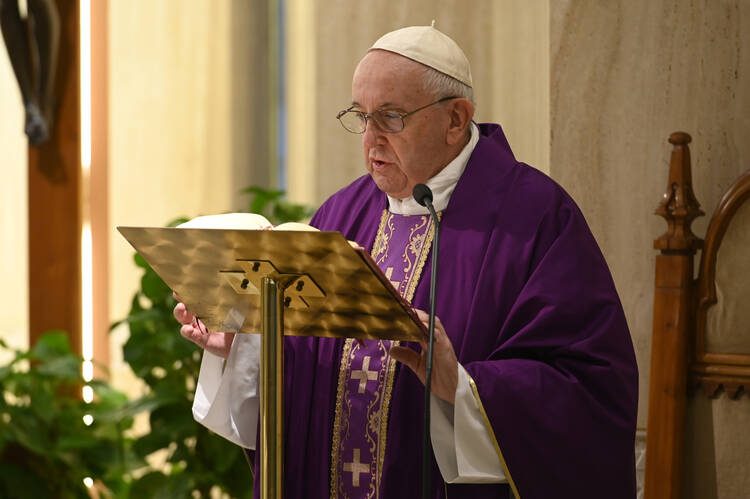Pope Francis has approved two new liturgical texts to be used during the coronavirus pandemic: The first is a special “Mass in Time of Pandemic,” and the second is a special intention to be used during this year’s Good Friday liturgy.
The Congregation for Divine Worship has sent the texts to the world’s bishops and has published them on its website.
Cardinal Robert Sarah, prefect of the Congregation for Divine Worship, wrote in the decree accompanying the texts for the Mass, dated March 30: “In these days, during which the whole world has been gravely stricken by the Covid-19 virus, many requests have come to this dicastery to be able to celebrate a specific Mass to implore God to bring an end to this pandemic.”
The texts, which were also issued in Latin, can be used for any Mass during the pandemic except for: solemnities; Sundays in Advent, Lent and the Easter season; the Easter octave; All Souls’ Day; Ash Wednesday; and Holy Week. The decrees are effective immediately, so the Mass could be celebrated using this text as early as today.
“In these days, during which the whole world has been gravely stricken by the Covid-19 virus, many requests have come to be able to celebrate a specific Mass to implore God to bring an end to this pandemic.”
The news was first reported on a blog hosted by the New Liturgical Movement then confirmed by Vatican correspondent Gerard O'Connell.
Cardinal Sarah wrote in a second decree that a special intention can ordinarily be added to the Good Friday intentions “in a situation of grave public need.”
“The Celebration of the Passion of the Lord on Good Friday this year has a particular significance because of the terrible pandemic that has stricken the whole world,” the cardinal wrote. “Indeed, on the day on which we celebrate the redeeming passion and death of Jesus Christ on the Cross, who like a slain lamb has taken upon himself the suffering and sin of the world, the church raises her voice in prayer to God the Father Almighty for all humanity, and in particular for those who suffer most, while she awaits in faith the joy of the resurrection of her Spouse.”
The Good Friday intention prays “for all those who suffer the consequences of this pandemic” and asks God to “look with compassion on the sorrowful condition of your children who suffer because of this pandemic; relieve the pain of the sick; give strength to those who care for them; welcome into your peace those who have died; and, throughout this time of tribulation, grant that we may all find comfort in your merciful love.”
The text for the Mass in Time of Pandemic likewise prays for those affected: “Look with compassion on the afflicted, grant eternal rest to the dead, comfort to mourners, healing to the sick, peace to the dying, strength to health care workers, wisdom to our leaders and the courage to reach out to all in love, so that together we may give glory to your holy name.”
With reporting from Gerard O’Connell, Vatican correspondent










